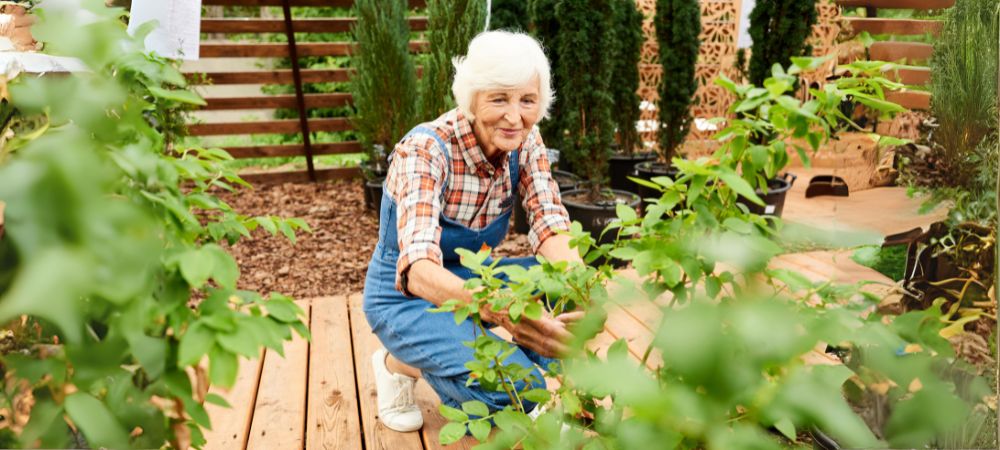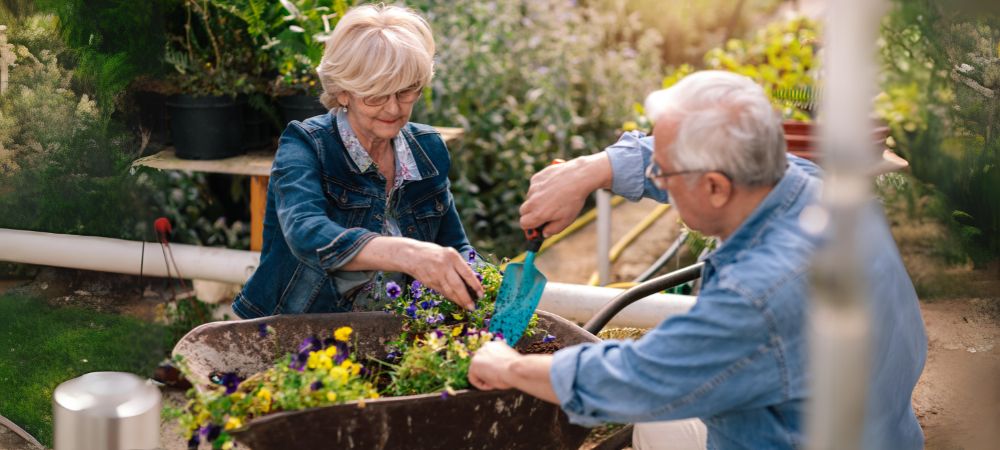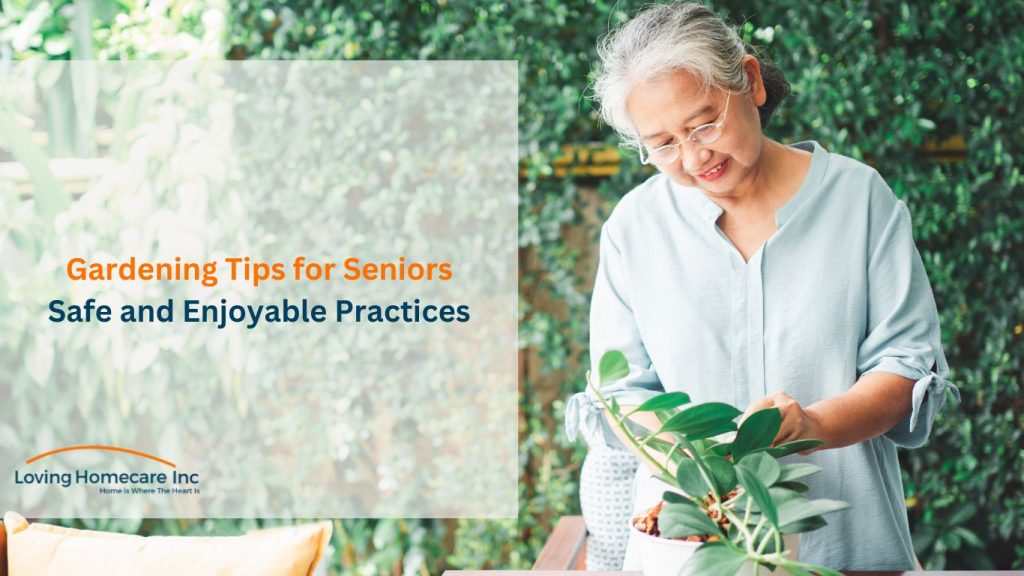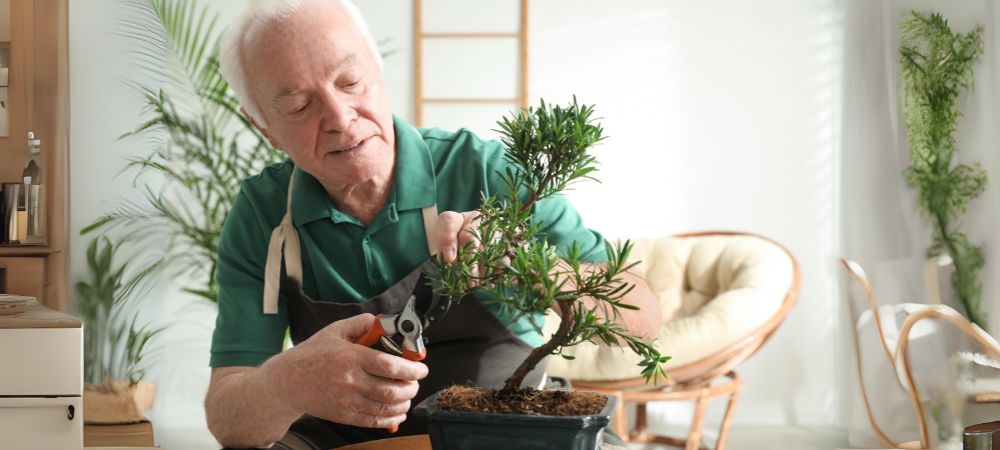Recently updated on June 25th, 2024 at 10:48 am
Gardening for seniors is not just a pastime, but a source of joy and satisfaction. It’s a therapeutic activity that offers myriad physical and mental health benefits. As we age, we must approach gardening with safety and enjoyment in mind. By incorporating some practical tips and adjustments, seniors can continue to revel in the joys of gardening while minimizing the risk of strain or injury.
- Choose the Right Tools: Selecting lightweight and ergonomic gardening tools can make a difference for seniors. Look for tools with cushioned handles and long reach to reduce bending and stooping. Additionally, tools with easy-to-grip handles can enhance control and lessen strain on arthritic hands.
- Create Accessible Raised Beds: Raised beds raise the garden to a more manageable height, reducing the need for excessive bending or kneeling. Seniors can build or purchase raised beds tailored to their specific needs, ensuring easy access to plants without putting undue stress on their bodies.
- Opt for Low-Maintenance Plants: Low-maintenance plants can simplify gardening tasks and make upkeep more manageable for seniors. For instance, consider planting succulents, which require minimal watering and can thrive in various light conditions. Native plants or varieties like lavender, which require minimal pruning and can attract beneficial insects, are also a good choice. This way, seniors can enjoy a flourishing garden without feeling overwhelmed by demanding maintenance routines.
- Implement Safety Measures: Ensuring seniors a safe gardening environment is paramount. Rest assured; by following these safety measures, gardening can be a secure and enjoyable activity. Install sturdy handrails along garden paths to provide support and stability. Remove any tripping hazards such as rocks, branches, or hoses. Additionally, sun protection and staying hydrated are essential to prevent sunburn and dehydration during outdoor activities.
- Enlist Help When Needed: Seniors should not hesitate to ask for assistance with heavier tasks or more labour-intensive gardening activities. Whether it’s enlisting the help of family members, hiring a gardener for occasional maintenance, or joining a community gardening group, having support can make gardening a more enjoyable and sustainable hobby.
Benefits of Gardening for Seniors:

Physical Benefits:
Gardening activities can significantly contribute to seniors’ physical health. According to the American Society for Horticultural Science, gardening activities like digging, planting, and weeding can help improve strength, flexibility, and endurance, reducing the risk of falls and enhancing overall mobility. Furthermore, outdoor exposure exposes seniors to natural sunlight, promoting vitamin D synthesis, crucial for bone health and immune function.
“A study published in the Journal of Aging and Health found that seniors who participated in gardening experienced lower pain and stiffness than those who did not engage in such activities. The repetitive but gentle movements involved in gardening can also help alleviate symptoms of arthritis and joint stiffness, making it an ideal low-impact exercise for elderly individuals”.
Mental and Emotional Benefits:
Gardening has been shown to have profound effects on mental health, particularly for seniors. In home senior care even suggests the presence of plants for the better mental health of seniors. Nurturing plants and witnessing their growth can instil a sense of accomplishment and purpose, boosting self-esteem and confidence. Research conducted by the University of Exeter found that gardening can significantly reduce symptoms of depression and anxiety in older adults, providing a natural antidote to feelings of loneliness and isolation.
For personal care of seniors facing cognitive challenges such as dementia or Alzheimer’s disease, gardening can serve as a therapeutic outlet. The sensory stimulation provided by engaging with various textures, scents, and colours in the garden can help stimulate memory recall and cognitive function. According to the Alzheimer’s Association, planting, watering, and harvesting can evoke memories and foster a sense of familiarity and comfort for memory-challenged seniors. Additionally, the repetitive nature of gardening tasks can provide a sense of structure and routine, which can be beneficial for seniors with memory challenges.
Indoor gardening for the elderly people can also be a viable option for seniors with limited mobility or who live in climates with extreme weather conditions. Container gardening or cultivating indoor plants provides a creative outlet, purifies indoor air, and enhances the aesthetics of living spaces.
Incorporating senior gardening into the lives of seniors not only promotes physical activity and mental stimulation but also fosters a deep connection with nature, contributing to a greater sense of overall well-being. As renowned horticultural therapist Sue Stuart-Smith aptly says, “Gardening is a therapeutic intervention because it promotes well-being through interaction with nature.”
Safe Gardening tips for seniors:-

- Warm Up and Stretch: Before diving into gardening tasks, seniors should take the time to warm up their muscles and joints with gentle stretches. This helps prevent strain and injury, especially if they’re engaging in bending or lifting activities.
- Use Proper Lifting Techniques: When lifting heavy objects such as bags of soil or pots, seniors should remember to bend at the knees, not at the waist, and use their leg muscles to lift. Avoid twisting while lifting to prevent back injuries. Consider using a gardening cart or wheelbarrow to transport heavy items.
- Stay Hydrated and Take Breaks: Gardening can be physically demanding, especially in hot weather. Seniors should drink plenty of water and take regular breaks to rest and rehydrate. Schedule gardening tasks during the more excellent parts of the day to avoid overheating.
- Protect Against Sun Exposure: Seniors should wear sunscreen, a wide-brimmed hat, and lightweight, protective clothing to shield against harmful UV rays. Sunglasses can also help protect their eyes from glare and debris while working in the garden.
- Mind Your Balance: Ensure stable footing while gardening to prevent slips and falls. Seniors should wear sturdy, non-slip footwear and avoid working on uneven or slippery surfaces. Consider using a gardening stool or knee pad to support and reduce the risk of losing balance while kneeling or bending.
- Be Mindful of Garden Tools: Choose lightweight, ergonomic tools with cushioned handles to reduce strain on hands and joints. Keep tools properly maintained and sharp to ensure efficient and safe use. Store tools in a designated area to prevent tripping hazards when not in use.
- Watch Out for Wildlife and Pests: While gardening, be aware of potential encounters with stinging insects, poisonous plants, or sharp thorns. Seniors should wear gloves and exercise caution when handling unfamiliar plants or reaching into dense foliage. Consider using natural pest control methods to minimize exposure to harmful chemicals.
- Stay Connected: Seniors who garden alone should inform someone of their gardening activities and whereabouts, especially if they have any medical conditions or mobility limitations. Carrying a mobile phone or having access to a nearby neighbour or family member can provide peace of mind in emergencies.
Tips for Gardening with Memory-Challenged Seniors:
Here below are the tips for the gardening for memory challenged seniors:
- Choose Easy-to-Grow Plants: Opt for low-maintenance plants that are easy to grow and require minimal care. Hardy perennials, such as daylilies or hostas, and resilient annuals, like marigolds or petunias, can thrive with minimal attention, making them ideal choices for memory-challenged seniors.
- Create a Simple Garden Layout: Keep the garden layout straightforward and easy to navigate. Avoid complex designs or overcrowding, which can overwhelm seniors with memory issues. Clear pathways and raised beds can help maintain accessibility and safety in the garden.
- Label Plants and Tools: Use clear labels and visual cues to help seniors identify plants and gardening tools. Colour-coded labels or picture signs can aid memory recall and make it easier for seniors to participate independently in gardening tasks.
- Encourage Multi-Sensory Engagement: Emphasize plants that engage multiple senses, such as fragrant herbs, textured foliage, and brightly coloured flowers. Encourage seniors to closely touch, smell, and observe the plants, fostering sensory engagement and memory stimulation.
- Support and Supervision: Offer guidance and supervision as needed, especially when handling tools or performing more complex tasks. Be patient and supportive to the personal care for seniors, allowing them to participate at their own pace and ability level.
- Celebrate Achievements: Recognize and celebrate seniors’ gardening accomplishments, no matter how small. Acknowledge their efforts and contributions to the garden, reinforcing a sense of purpose and achievement.
By creating a supportive and sensory-rich gardening environment, memory-challenged seniors can experience the joys and benefits of gardening while engaging their senses and nurturing cognitive function.
Gardening Adaptations for Seniors
- Raised Beds and Elevated Containers: Raised beds bring gardening to a comfortable height, reducing the need for bending or kneeling. Seniors can build or purchase raised beds that suit their needs. Elevated containers, such as tabletop gardens or hanging baskets, provide accessible gardening spaces for those with limited mobility.
- Container Gardening: Container gardening offers versatility and convenience for seniors. It allows them to garden in smaller spaces or on balconies and patios. Seniors can grow various plants in containers of different sizes and materials, including flowers, herbs, and vegetables.
- Vertical Gardening: Vertical gardening maximizes space and accessibility by growing plants upward instead of outward. Trellises, wall-mounted planters, and vertical gardening systems allow seniors to cultivate plants vertically, minimizing bending and reaching.
- Adaptive Tools and Equipment: Ergonomic tools with cushioned handles and lightweight materials reduce strain on seniors’ hands and joints. Long-handled tools extend the reach and minimize bending. Tool organizers and caddies keep essential gardening equipment within easy reach.
- Accessible Pathways and Work Areas: Clear, level pathways and work areas ensure safe and comfortable movement around the garden. Non-slip surfaces, handrails, and sturdy benches provide seniors with gardening support and stability.
Indoor Gardening Ideas for Seniors
- Herb Gardens: Indoor herb gardens are ideal for seniors who enjoy cooking or want to add fresh flavors to their meals. Compact herb plants like basil, parsley, and thyme can thrive on windowsills or countertops with ample sunlight.
- Potted Plants: Seniors can cultivate indoor plants to improve air quality and enhance the ambience of their living spaces. Low-maintenance houseplants like pothos, snake plants, and peace lilies require minimal care and can thrive indoors.
Benefits of Container Gardening and Vertical Gardening
- Accessibility: Container and vertical gardening make gardening accessible to seniors with mobility issues or limited outdoor space. By bringing the garden to eye level or utilizing vertical space, seniors can garden comfortably without excessive bending or kneeling.
- Versatility: Container gardening allows seniors to experiment with different plant varieties and arrangements. They can grow flowers, herbs, vegetables, and even small fruit trees in containers of various shapes, sizes, and materials.
- Reduced Maintenance: Container gardening typically requires less maintenance than traditional garden beds. Containers retain moisture more effectively, reducing the frequency of watering. Seniors can also control soil quality and nutrient levels more easily in containers.
- Space Optimization: Vertical gardening maximizes gardening space, making it ideal for seniors with limited outdoor areas. Vertical planters, trellises, and hanging baskets allow seniors to grow diverse plants without sacrificing valuable floor space.
By implementing these adaptations and exploring indoor gardening options, seniors can continue to enjoy the therapeutic benefits of gardening while accommodating their unique needs and preferences.
Conclusion
- Gardening offers a therapeutic and fulfilling activity for seniors with memory challenges.
- Sensory gardens with fragrant herbs and textured plants provide rich stimulation for memory-challenged seniors.
- Simple garden layouts and easy-to-grow plants make gardening accessible and enjoyable for seniors of all abilities.
- Engaging in gardening tasks promotes cognitive function, reduces stress, and creates a comforting and familiar environment.
- With proper support and encouragement, seniors can experience the physical, mental, and emotional benefits of gardening for years.
- Gardening offers seniors many physical, emotional, and cognitive benefits, but it’s crucial to approach this hobby with caution and mindfulness.
For personalized senior care, explore loving homecare options today.


